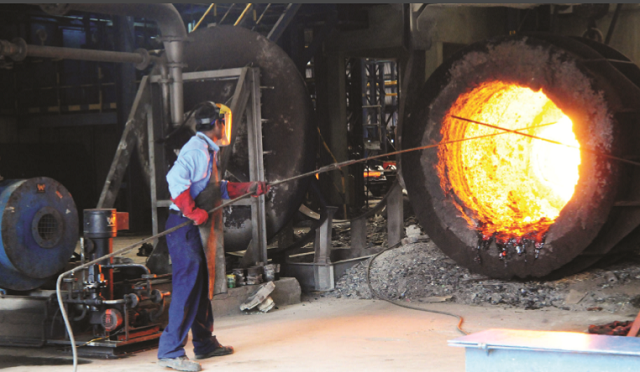
Sector positive on government promise of deals in infrastructure projects
Like most of the Uganda’s manufacturing industry, 2016 was brutal for the steel industry, with dwindling production due to low demand.
Uganda has 12 steel mills with a production capacity of more than 500,000 tonnes annually, but the country’s steel processing firms had to cut their production to between 30-50% in 2016 over low demand.
Over the same period, however, the country imported 20 to 25 % of steel sold locally and in the regional market, according to the industry executives.
Mostly imported steel was used in on-going major public infrastructure projects including two hydroelectricity power dams at Karuma 600MW and Isimba 183MW, and the Kampala-Entebbe Express Highway. These projects are being undertaken by Chinese firms which sourced steel products from China instead of buying locally.
Meanwhile, the local steel industry is feeling the pain. One of the country’s oldest steel mill; the Steel Rolling Mills which is a subsidiary of Alam Group of Companies started running into financial trouble when its production fell by half to around 36,000 metric tonnes.
The worst came in April when the firm failed to meet its loan obligations and went under receivership over failure to pay Shs50 billion owed to Standard Chartered Bank.
Sensing trouble, the government stepped in. First, President Yoweri Museveni directed that no accounting officers should buy government products from foreign markets when similar or equivalent products are also manufactured locally. He said his directive was intended to promote local industries.
Then on November 17, 2016, the Minister of Trade and Industry, Amelia Kyambadde, announced that the government was officially implementing the Buy Uganda, Build Uganda (BUBU) Policy. Unveiled in 2015, the policy aims at increasing consumption of local products and increasing participation of the locally established firms in domestic trade.
Local manufacturing firms, especially those in the steel industry, had made numerous complaints to the government about being denied market for their products in the on-going infrastructural projects amidst the harsh economic environment on claims that that their products did not meet the required standards and thus hurting their operations.
This prompted the Trade and Finance ministries to carry out a countrywide survey in with the help of Uganda National Bureau of Standards to ascertain the capacities of the local industries to supply assorted materials to the huge infrastructure projects being undertaken by government.
Quality challenge remains
In the survey, 11 steel producing firms; including Steel Rolling Mills, Roofings Rolling Mills, Uganda Baati, Madhvani Steel, and the East African Roofing Systems were confirmed to have demonstrated capacity to meet the required standards and supply requirements.
Part of the findings, according to Kyambadde, were centered on the issue that most of the steel companies did not meet the requisite standards; namely producing steel bars from virgin iron and steel raw material which is a requirement to qualify to supply the Standard Gauge Railway (SGR).
Other issues centred on the technology required in their manufacture process, for instance the need for zignalization technology as opposed to zinc coating to protect the steel bars which is widely used in the steel companies.
Kyambadde told journalists in Kampala in November that some of these requirements call for a complete overhaul of the manufacturing belt to include these technologies that are needed for the SGR. Her position reveals the extent to which quality issues are a major challenge to the local steel industry.
A 2011 study conducted by Kyambogo University don Christopher Senfuka and others on the “Options for improvement of the Ugandan Iron and Steel Industry” shows that obsolete technology, lack of proper training and appropriate technology transfer initiative and absolute lack of research and development at enterprise level have held back productivity, capacity utilization, product diversification and enterprise advancement.
“The major raw material is scrap iron which is also getting scarce,” the study says in part, adding that quality related issues have also not been effectively addressed to ensure that only standard and reliable products reach end users.
But Kyambadde told journalists that the companies that demonstrated capacity will be recommended to supply steel to the on-going government projects including new ones expected in 2017 like the Standard Gauge Railway project and the Kampala-Jinja Express Highway.
The pledges of new deals made by President Museveni and Minister Kyambadde appear to have breathed confidence in the steel sector.
Abid Alam, the managing director of Alam Group – owners of the ailing Steel Rolling Mills, is so optimistic that he has renewed negotiations with creditors to pull his company out of receivership. Alam told The Independent in an interview that 2017 will be a better for the country’s steel industry following government’s move to implement the BUBU Policy. He says steel firms have improved with regard to the quality of raw materials, technology and manpower to produce high quality products.
 The Independent Uganda: You get the Truth we Pay the Price
The Independent Uganda: You get the Truth we Pay the Price



